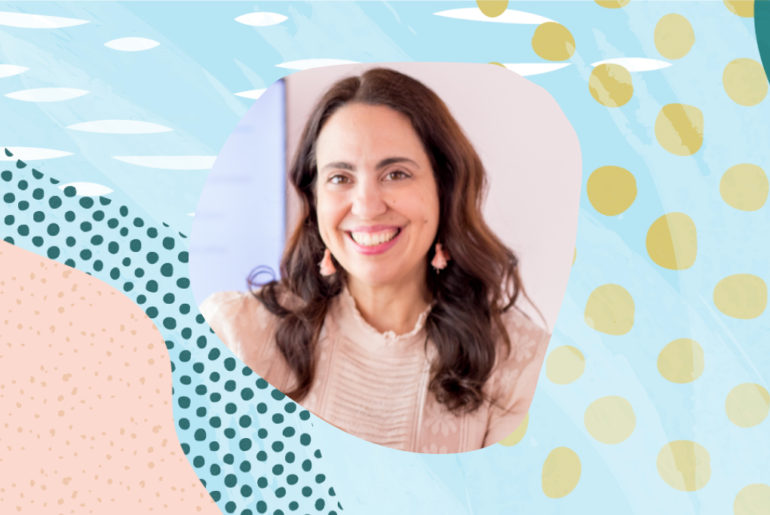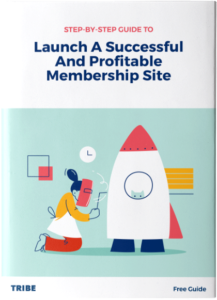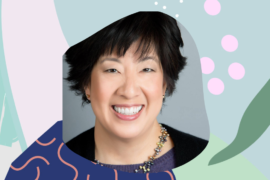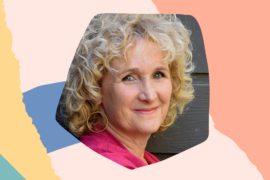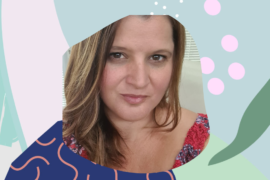Manu Muraro spent 15 years as a creative marketer for Cartoon Network. After she got laid off, she went to a startup, but the experience of being on all the time while holding a baby in her lap left her feeling exhausted, burned out, and unsatisfied.
She decided to look slowly for another job and freelance until she found her next role. However, freelancing naturally led her to launch a membership business. Now, at Your Social Team, she helps social media managers and entrepreneurs use Instagram to take the guessing game out of content creation and generate top-performing posts.
Today, Manu joins the podcast to share her story of healing from burnout, creating her own opportunities where others might see closing doors, and the beauty of saying “yes” – even when you don’t have all the answers.
Key Takeaways
- The moment Manu knew she needed to take a leap and launch her own business.
- What Manu did when she was un-invited to a big marketing conference after she got laid off from her startup job – and how this led her to sell out her first event.
- The power of collaborating with and believing in people with huge potential.
- Why you don’t need to figure everything out to launch your membership site.
Free Give
FREE Guide – Launch & Grow a Profitable Membership Site
Ready to reclaim your time and attract more monthly paying customers? Our step-by-step guide will show you how to build a membership site that turns your passion into recurring profit. Click here to download!
Memorable Quote
- “I think if you’re not bringing something different to the table, you should go back to the drawing board because people come to you for you. There are so many people that do exactly what I do but they come to me because I have a certain style not because they just want exactly what other people offer.” – Manu Moraro
Episode Resources
Transcript
Read The TranscriptShelli Varela: Manu Muraro, welcome to the It’s a TRIBE Thing Podcast. How are you?
Manu Muraro: Good. I’m so excited to be here with you today, Shelli.
Shelli Varela: We are excited to have you. Can you start with who you serve and what you do?
Manu Muraro: Yes, absolutely. So, what I do is I help people using Instagram, mostly social media for business, to actually see results in their business and revenue, not necessarily all numbers on Instagram, and not being on that platform 24/7 and not being overwhelmed.
Shelli Varela: That’s really cool. So, what I hear you saying is it’s not really just about the numbers if you want connections and if you want sales, and you don’t have to be there as much time. That’s interesting.
Manu Muraro: Yeah. I joke that my favorite vanity metric is money in the bank.
Shelli Varela: Well, you can’t argue with that. So, how did you come to this? Who were you before you started creating a membership site for social media and allowing people to have that kind of freedom?
Manu Muraro: Yeah. So, I have a background in corporate and creative, and marketing. I worked for 15 years for Cartoon Network. I’m originally from Brazil but I moved to the US to work there for the international market. So, I was in a very different place. I did not have the entrepreneurial spirit. My husband is a serial entrepreneur. I’m like I’m happy here. As long as I’m excited with my projects, I don’t care. But as my career went and I got two laid-offs on me and I was working for a startup and my last job at a startup, which I stayed in Cartoon Network for 15 years and a startup for two years and that job on a startup, I was so overworked like crazy and I was in a phase that I literally had a baby in my lap and I’m looking at my phone at all times, and I’m being pinged on the weekends for no reason. I’m just like, “This is not fun anymore.” So, after I was laid off from that job, which was really coinciding when I was burnout as well, I needed to reevaluate things. So, I’m like I’m just going to freelance, I’m just going to look slowly for another job, and just freelancing between, and the freelance turns into a business, which turns into a membership.
Shelli Varela: Okay. So, hang on a second. That’s a lot. So, when you first got laid off from corporate and, to your point, you were saying you were perfectly happy. As long as you were happy with your project, you were happy to be in corporate. And then you get laid off and there’s that sense of, “Holy smokes, this is not as secure. I’m taking the safe road.” Jim Carrey talks about his father and he said his father was the funniest man he knew but he did the smart thing and the bankable thing, and he got a job I think as an accountant. And he said, “So, you can fail doing the things that you don’t love. So, if you’re going to fail, you might as well fail at the things you love.” So, when you got laid off from your corporate job, how did that lead you to starting the membership site, like what happened in those steps in between?
Manu Muraro: So, I still thought, you know, I was just going to Jim Carrey’s father’s route so I was getting my second job, which was in a startup. When I was laid off of that one, that’s when I was really burned out. I actually loved my only two jobs I had like after graduating, which lasted 17 years, but my personality is like as long as you have a healthy group of people around you and you have things that are interesting where you’re good at, you’re learning, and you’re being compensated, I’m happy but I was getting burned out. There was too much going on. So, when that happens, I’m like I really want to be in charge of what I do, when I do it, who I do it with. I want to be experimental. One thing that I love about my business is that I can try anything I want and then you abandon it if it doesn’t work and you can insist. Even if it cost you a little money at the time, you can still do it. So, I think having that freedom, I was definitely in a place in my life that and that place in their life can be early for people and later. For me, it was later because I was almost 40 and I had a baby and I was in a different phase of my life. But this could be that you feel that way like when you’re younger, too. You’re just like, “I want to be able to do it myself, to control it myself.”
It was just one of those things that the longer I kept going, I joke that when you’re an entrepreneur and you start a business, you’re like, “I’m quitting this. I’m getting a full-time job.” You say that maybe like 10 times a week then it goes to like five times and then you start saying once a month. I used to wake up and look at my husband in the morning and be like, “Okay. I’m getting a job like this is not working.” And I never say it anymore.
Shelli Varela: It’s like the old adage. There’s a meme and it’s like the entrepreneurial success path and it looks like a ball of tangled yarn and then at the end. So, what does that look like for you as you transition? Because I know as we were chatting earlier, you said you had a really big decision to make after you got laid off and you weren’t ready to completely jump. And so, you talked about freelancing. What did that look like for you?
Manu Muraro: Yeah. So, that kind of started happening naturally because I’ve always been very good at networking and kept my contacts pretty close. So, freelancing was fine but it wasn’t a career for me at that point in time. It wasn’t a business. It was just like paying some of the bills. I didn’t see myself as a business at that point in time. It just saw me like I was somewhere in between. So, I think things really didn’t click until I actually threw an event that it was a course, a class that I did in-person and I did that like just a few months into freelancing. Literally, that week, I did that. That’s when I came up with the name of my business and I just became a business out of the blue, which was great. I started with very little, which is something that I always tell people, like someone asked me, “How do I start my own business? What do I need to start my own business?” then I’m like, “One client.”
Shelli Varela: One client and the ability to say yes even when you don’t know how.
Manu Muraro: Yes.
Shelli Varela: To your point, we were chatting earlier and you were talking about how you were freelancing and you’re doing social media, and you realize that you really actually love the teaching portion of it and that you had the opportunity to speak at this conference. Can you tell everybody the rest of that story?
Manu Muraro: Absolutely. Yeah, that’s a great story, actually. So, it’s like very petty but I was invited to speak at a conference when I was in the startup that was very high visibility here in Atlanta and was this big marketing conference. When I was laid off, I reached out to them and I was like, “Oh, let me tell those guys that I’m not with the company anymore.” As soon as I said that, they dismissed me from the conference which is really silly because I still know the same amount I knew before then but they dismissed me. They’re like, “Sorry. We cannot have you then,” and I’m like, “Okay, great.” So, I’m like, “You know what, I’m going to do my own event.”
Shelli Varela: I love it.
Manu Muraro: I know. And I actually went on. So, I did my first event and I reached out to everybody I knew one-on-one personally via personal Facebook. I didn’t have a company Facebook or Instagram, anything at that point. I was just starting. So, I literally reached out to everybody I knew and I was able to sell out 25 tickets the first event. You know, fast forward later, I went on to creating like I’ve done, I’ve hosted three sold-out conferences after that. So, I just created my own. It was so much better than the marketing conference.
Shelli Varela: So, just for anybody listening, so you have this opportunity because I just want to circle back on this because this is genius, you have this opportunity, you have these skills that is the thing that brought you to this opportunity but because you now are no longer associated with the A player or the influencer, they say, “Thank you. No, thank you.” But you instead of just saying, “Okay. Well, that’s really disappointing,” decide you’re going to create your own opportunity, having never run an event before, not knowing how you’re going to do it, not necessarily having hundreds or thousands of people to reach out to you just like bootstrapping feet on the streets, guerilla marketing.
Manu Muraro: Totally. Yeah. No, it was awesome like I think I’m not going to say I didn’t get upset. I mean, yeah, it was a hit in the face and you’re like you’re already laid off. You don’t know what the future is going to hold and they’re like, “We don’t want you anymore. You have no more value to us.” Of course, I was like, “Ah,” but I really believe in trying to get that energy and putting in something that you can act in a positive way.
Shelli Varela: So, what was the result of that first event?
Manu Muraro: Yeah. So, that first event, there was a lot of people I knew from all walks of life and they’re also nice about giving me feedback. I actually asked them to just give me a lot of feedback on like things that would be helpful to have next time, the parts they like the most, what they didn’t think was that helpful so I could just kind of build on to the next time. But right after that, the next thing I’ve done, since I had lots of connections from my years in corporate, from my years in the startup, but no one knew me, Your Social Team. No one knew who that was, right? I just came up with that the night before in my bathroom. So, I wanted to make a connection with like me, who I am, and put it out starting locally here in my city is how I did it. So, I partnered with an influencer who was doing Instagram really well and I said, “Hey, let’s do an event together.” One night, we do on sort of like teaching how I did my other event but we do half-and-half. You teach an hour, I teach an hour, I pay you for it and I also want in the scope of work that not only I pay you for the work itself in the event of for you being in the event, but I also pay you for posting about it.” We sold out that day with this girl posting about it. We had like I think it was 50 people in that event, and it was great.
Shelli Varela: Hang on a second. This is amazing. So, just to circle back, you’re a person who gets dismissed from speaking at a corporate event. You create your own. You bootstrap it. You find enough people to make it viable and you do, and you crush it. Then you have an idea. So, going back to when you got dismissed from that first event, because you weren’t an influencer, because you weren’t now attached to the A company, now you’re a person who’s going to iterate on this live event and you’re going to bring in an influencer, and you’re going to have the influencer work for you because you are the person that has the idea. That is amazing.
Manu Muraro: Another coolest part about this, this girl who was amazing and we still collaborate a bunch, she actually just taught a guest class to my members a couple of months ago. So, I met her because when I was in a really cool startup, she reached out. She had maybe like 3,000 followers on Instagram and she reached out and said like, “I really want to do something in the firm you guys have. Can you set me up?” I set her up. I treated her like she had 200,000 followers. Funny enough, fast forward to when I actually wanted to partner with someone, she’s there with her 100,000 followers. We did this together and it was a huge success for both of us because also like I was giving her this project, paid, nicely done, and more organized. And so, I think that says a lot about relationships too.
Shelli Varela: For sure. I really loved it. Memberships really are all about collaboration, not even just for your community but bringing in guest experts. That’s another thing that is important to mention. You can be the expert that’s teaching all of the topics or you can be the curator that brings in people just because of the contacts you have. It really does speak to serving people and being kind to people because the time when you need them to show up for you, there they are.
Manu Muraro: Oh, yeah. I also like I pay my guest teachers too in my membership, but I also do a hybrid. I teach one class per month. So, I teach two classes, and then I have a guest quarterly. That has worked out really nicely because there are other things that I don’t want to get into that are not exactly my expertise but they really complement what I provide. It also just brings this new person to a new audience and just more contacts and connections to the members. So, it’s been really great and I also do the guest classes every time I close the cart, which is pretty fun because it’s like extra hype for people to join right away.
Shelli Varela: So, what did you learn by having a membership site that surprised you in a good way?
Manu Muraro: So, I think I started with no plan. I actually did try this year and this is year two of my membership. Sometimes I wish I’ve done it from the start. I didn’t even know TRIBE existed. I was not in the membership world back then. I was just like I’m going to do this thing and I set up a group on Facebook and said to people I’ll send them an email monthly, and then the group on Facebook, and that was it. So, the way I was doing my founder’s launch without necessarily knowing the strategy. But what I learned is that, I mean, lots of things, obviously. I think if you’re not bringing something different to the table like you should go back to the drawing board because people come to you for you. There are so many people that do exactly what I do but they come to me because I have a certain style not because they just want exactly what other people offer. So, I think that’s something to look into. But mostly, I think just cultivating the community and getting to know the people in there and serving them because to me, my membership may be different than other memberships. I mean, I know that there are all sorts of types of memberships but mine doesn’t have a beginning and an end and you learn something. It’s just continuing with so many are, but when that happens, it doesn’t mean that people come from zero and they finish at 100. Everybody’s in a different space.
So, that’s something that I am always trying to improve in how to serve people that are in the different phases that they are without overwhelming like that’s really big for me is not overwhelming people. I think we’re all overwhelmed already. And so, I really tried to damper even like how I promote it. I don’t even talk about the seven benefits they have. I focus on two things and that’s what I sell. So, I think that helps people just kind of keep on track of what it is they understand and a lot of them are new to memberships. So, it definitely helps to just focus on a few key things and know that they should focus on this as well. I have like a library of classes there that they can catch up on and I say to them, “Catch up on the class of the month and one more. That’s two hours per month. That’s all I want you guys to do. I don’t want to do any more than that.” So, I think that kind of helps.
Shelli Varela: I love that all of this comes back to at some point you saying yes without having all of the answers. If somebody right now is thinking of having a membership site and is hearing us for the first time or looking to expand their membership site, what advice would you give that person?
Manu Muraro: Yeah. So, I’ll tell them to just start where they are. They don’t need to figure everything out. No one figures everything out before they start. I would just start with what they have. If I started mine, you wouldn’t believe where I started my membership. I was 42 years old. I had a one-month-old at that point because it took me like two months from that pregnant like realization to actually put it out there. My baby was two months old and I was sitting in an Airbnb because my house is being renovated. My life was upside down and a freaking mess. I send out one email, create a Facebook group. That was it. I wasn’t on Kajabi, any fancy social media like any fancy membership platforms, didn’t have like a slinky website with like locked content in it. Today, I do. I did not have any of those things but I also feel like if I waited until I actually had all the tools and all the systems in place, I wouldn’t have done it. It would have taken me so long. And I still started a membership and start making 30,000 extra a year that I wasn’t making on my business before I send that email out. So, I think just starting with what we have and stop trying to look perfect to everybody is a good advice, I would think.
Shelli Varela: I love the statement, “You can’t steer a parked car,” and you just so beautifully articulated that. Sometimes you just have to start driving and then you could be around the corner.
Manu Muraro: Absolutely.
Shelli Varela: Oftentimes too, your community will tell you what they want, what they need, and how they need it or how they want it.
Manu Muraro: Absolutely. Yeah, for sure. I think the one thing that you shouldn’t do from the start is to start to have a really high price and then lower it. That’s when things get messy. Other than that, you can really just shape it as you go.
Shelli Varela: I love it. If people are looking for you online, where’s the best place they can connect with you?
Manu Muraro: Well, my website, YourSocial.team, and on Instagram @YourSocialTeam. Like I’m always there, I respond to DMs myself, and there are lots of good tips there for those doing their own marketing.
Shelli Varela: Sounds amazing. Thank you so much for stopping by.
Manu Muraro: Thank you so much, Shelli. Absolutely. It was a pleasure.
[END]
[END]
To learn more and get access to all episodes, visit our podcast page!
